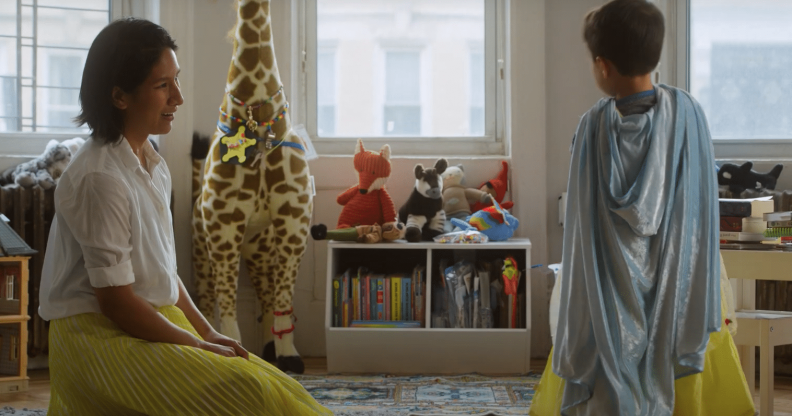Groundbreaking documentary series narrated by Olivia Colman explores how all children have a fluid sense of gender

Apple TV’s Becoming You tells Kiran’s story. (Apple TV)
Becoming You, a new Apple TV documentary series, explores how children don’t think of themselves as having a fixed gender until they reach school age.
The new series, released Friday (13 November) on Apple TV Plus, follows the experiences of 100 children from all around the world, charting their first five years of life.
Narrated by Olivia Colman, Becoming You spotlights children such as Kiran, who is seen going through a “princess phase”.
“Like all children his age, Kiran doesn’t think of himself as having a fixed gender,” Colman says in the show.
“In his mind, he can switch between being a boy or a girl.
“For parents, this might seem puzzling as their baby’s sex is usually the first thing they want to know.”
Executive producer Hamo Forsyth told the Advocate he hopes Kiran’s story and others like it in the show help viewers understand that “although young children talk about gender, their sense of it is much more fluid than ours”.
“So much so that kids of three [and] four can imagine they are genuinely going from one gender to the other as they change clothes during dressing-up games, for example,” he said.
“It isn’t really until they go to school at five that they start to think of gender as something more permanent.
“As a general rule, when they go to school, boys start to group with boys and girls with girls and the divide starts to really show. Before that, they are far more likely to intermingle and engage in each other’s games.”
Becoming You comes at the tail end of a stellar year for queer documentary-making.
In June, Netflix released Disclosure: Trans Lives on Screen, a breathtaking look at the history of trans representation in the media that has already been labelled a seminal watch.
Directed and produced by Sam Feder and executive producer by Laverne Cox, it includes interviews with the likes of Angelia Ross, Mj Rodriguez, Trace Lysette, Chaz Bono, Lilly Wachowski and many other trans actors and filmmakers.
One notable part of the film saw writer Jen Richards explain why representation is so important.
“Having cis men play trans women, in my mind, is a direct link to the violence against trans women,” she says in a clip which subsequently went viral.
“And in my mind, part of the reason that men end up killing, out of fear that other men will think that they’re gay for having been with trans women, is that the friends – the men whose judgement they fear of – only know trans women from media, and the people playing trans women are the men that they know.
“This doesn’t happen when a trans woman plays a trans woman.”

